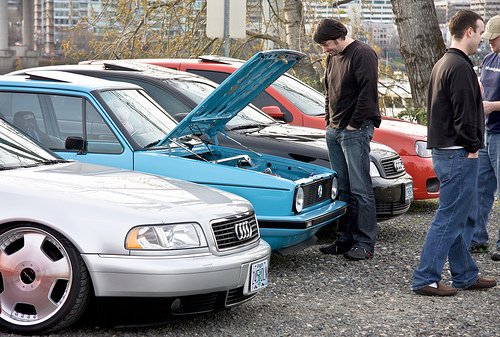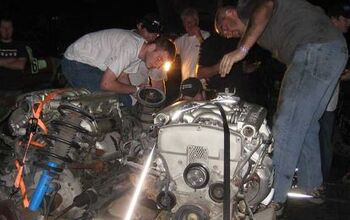How to Buy a Used Car - Pt. 3: Due Diligence (The Inspection)
[Ed: Part one of Steve Lang’s updated used car buying guide is here, part two is here.]
You can rigorously apply the tests described by previous installments of this series without encountering a single setback. However when it comes to buying a used car, it pays to assume one simple salient fact: you don’t know the complete truth.
At least not yet.
When it comes to pursuing the deeper truths about a used car an experienced mechanic will inevitably become your greatest ally and advocate. For most consumers finding a knowledgeable mechanic will be the most important step in the used car buying process.
Before we talk about that, I want to be perfectly clear on this point.
A used car is guilty until proven innocent. Do not buy one without taking the car for a professional inspection.
If the seller doesn’t agree to let you do so you’re done. Period. No exceptions. Ever.
Now mechanics tend to divide into three categories: the shade-tree, the Nazi and the diligent professional.
Shade-tree mechanics are hobbyists on limited budgets. Due to the lack of equipment (or experience), they may not be familiar with the unique wear issues and maintenance needs for your vehicle. The shade-tree mechanic will look at the car’s basics, take it for a short test drive and call it good (or “not bad”).
The Nazi will attempt to perform every mechanical test known to wrenchkind. Submit the car to a standard of inspection that is rooted in la-la land. Then make you financially fearful of buying anything other than (cough! cough!) one of their vehicles.
Obviously the Nazi is a non-starter.
Often times these party members will work for dealerships (but not always), and are therefore pre-occupied with meeting their service department’s monthly quota of service hours and revenue.
Unless your next car has a prancing horse or bull at the front of it, you’re usually far better off with a diligent mechanic.
The diligent mechanic will work through a standard check list and then take the car for a test drive in a variety of operating conditions.
Diligent mechanics are experienced independent professionals with established roots in your community. To find one, I strongly recommend visiting the Mechan-X files at Cartalk.com.
I also can’t over-emphasize the importance of personal recommendations; especially from people who own the same model of car you’re considering buying. Many small to medium-sized repair shops will post testimonials on their “ego wall.”
Read them carefully.
Before the inspection takes place, write the list of the concerns you created during the test drive. When you deliver the car for inspection, go over them with the mechanic one-by-one. Make sure you both have a clear understanding of all your potential concerns.
This will provide a base line for the inspection to follow.
Some mechanics inspect used cars for a set fee. Others charge an hourly rate. In both cases, the post-list discussion should conclude with a confirmation of the probable inspection cost. Leave some leeway; you don’t want the mechanic to stop their investigations for the sake of a few bucks. (Leave your contact number for this possibility.)
The best way to build a healthy relationship with any mechanic is to simply try not to be one of “those” customers.
Just let them get on with their job. Don’t stare at the mechanic while they’re doing the inspection. In fact it’s best to leave the premises entirely. And don’t phone your mechanic two hours later and ask for a status report; wait for their call.
Once the inspection is completed, sit down for a one-on-one debrief with the mechanic who made the inspection (even if you have to come back on another day). I always prefer to speak with the actual mechanic or at least have them in attendance with the “service advisor.”
Let the mechanic speak without interruption. Some diligent mechanics will go on for quite some time; some will simply say “here’s my report.” Either way review the information and let him explain every issue and potential issue to you.
After they’re finished, don’t be afraid to say “I don’t have a clue what you’re talking about” or “Is this a sign of normal wear or abuse?”
Make your own list of trouble spots from this conversation. Note down the potential cost to repair and whether or not the issue is urgent or eventual.
Once you’re finished the play-by-play, ask a few general questions. I always ask “Did the owner do a good job maintaining this vehicle?” and “Did the owner use good parts or cheap parts?” Either of these inquiries usually invites a deeper insight with the mechanic.
If the used car has survived the inspection process without revealing any critical issues to your diligent mechanic, it’s time for the final negotiation with the owner.
More by Steven Lang
Latest Car Reviews
Read moreLatest Product Reviews
Read moreRecent Comments
- Kjhkjlhkjhkljh kljhjkhjklhkjh A prelude is a bad idea. There is already Acura with all the weird sport trims. This will not make back it's R&D money.
- Analoggrotto I don't see a red car here, how blazing stupid are you people?
- Redapple2 Love the wheels
- Redapple2 Good luck to them. They used to make great cars. 510. 240Z, Sentra SE-R. Maxima. Frontier.
- Joe65688619 Under Ghosn they went through the same short-term bottom-line thinking that GM did in the 80s/90s, and they have not recovered say, to their heyday in the 50s and 60s in terms of market share and innovation. Poor design decisions (a CVT in their front-wheel drive "4-Door Sports Car", model overlap in a poorly performing segment (they never needed the Altima AND the Maxima...what they needed was one vehicle with different drivetrain, including hybrid, to compete with the Accord/Camry, and decontenting their vehicles: My 2012 QX56 (I know, not a Nissan, but the same holds for the Armada) had power rear windows in the cargo area that could vent, a glass hatch on the back door that could be opened separate from the whole liftgate (in such a tall vehicle, kinda essential if you have it in a garage and want to load the trunk without having to open the garage door to make room for the lift gate), a nice driver's side folding armrest, and a few other quality-of-life details absent from my 2018 QX80. In a competitive market this attention to detai is can be the differentiator that sell cars. Now they are caught in the middle of the market, competing more with Hyundai and Kia and selling discounted vehicles near the same price points, but losing money on them. They invested also invested a lot in niche platforms. The Leaf was one of the first full EVs, but never really evolved. They misjudged the market - luxury EVs are selling, small budget models not so much. Variable compression engines offering little in terms of real-world power or tech, let a lot of complexity that is leading to higher failure rates. Aside from the Z and GT-R (low volume models), not much forced induction (whether your a fan or not, look at what Honda did with the CR-V and Acura RDX - same chassis, slap a turbo on it, make it nicer inside, and now you can sell it as a semi-premium brand with higher markup). That said, I do believe they retain the technical and engineering capability to do far better. About time management realized they need to make smarter investments and understand their markets better.


































Comments
Join the conversation
I want to see an article about how lots of people buy salvage cars. You see high end cars all the time that are salvage- how good or bad are they? Maybe a pre article may be about how salvage titles are gamed by sellers routing them around various states.
I've always been happier with cars that were broken and non-functional when I bought them than cars that ran fine when purchased. I bought broken ones cheaply and immediately dove in and got familiar with the car as I fixed it. When the next problem arose, it was not so big a deal. With the cars that were functional when I bought them, The first inevitable failure was always a rude awakening......